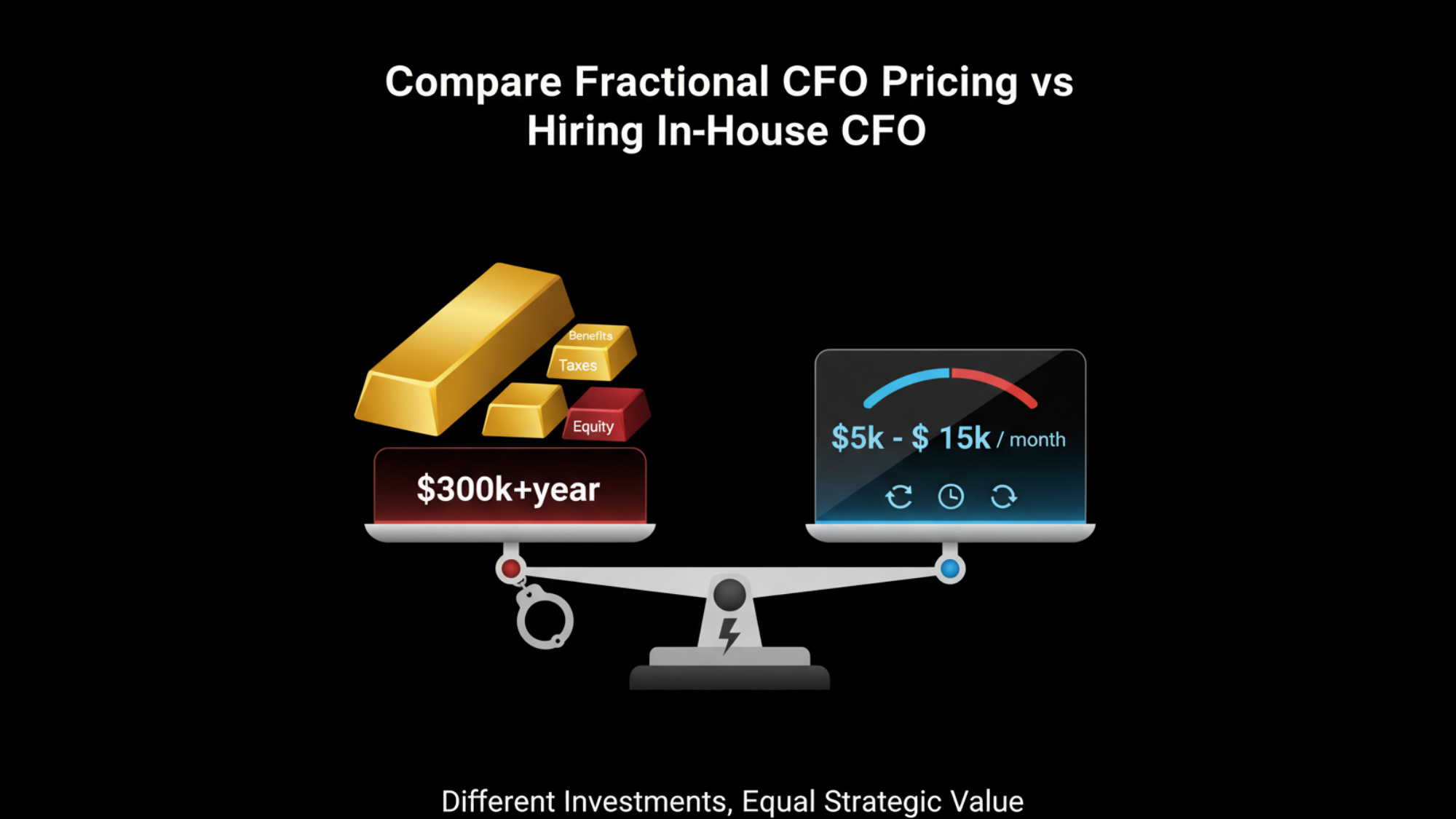Introduction: The CFO Dilemma Every Business Faces
Every growth-minded company eventually hits a financial complexity wall. Maybe cash flow has become unpredictable, fundraising is on the horizon, or compliance requirements are weighing heavier. The question inevitably comes: Do we hire a full-time CFO—or consider a fractional one?
Fractional CFOs offer executive expertise on a flexible basis, while in-house CFOs bring dedicated leadership. But which option makes more financial and strategic sense for your business? In this guide, we’ll break down fractional CFO pricing vs hiring in-house, run the numbers, and even provide a framework to help you decide.
Understanding the Costs: Fractional vs In-House
In-House CFO Costs
Hiring a full-time Chief Financial Officer comes with significant investment. On average:
- Base Salary: $200,000–$400,000+ annually (U.S. averages, depending on company size & location)
- Benefits & Taxes: Typically add 20–30% (healthcare, retirement contributions, payroll taxes)
- Equity / Bonuses: Many CFOs expect performance-based incentives or stock options
➡️ Estimated Total Annual Cost: $260,000–$500,000+
Fractional CFO Pricing
A fractional CFO provides services part-time or on-demand, scaling with your needs:
- Hourly Rates: $200–$500 per hour
- Monthly Retainers: $5,000–$15,000 depending on scope
- Project-Based Fees: $10,000–$50,000 for fundraising, audits, or acquisitions
➡️ Estimated Total Annual Cost: $60,000–$180,000 (for ongoing support)

Fractional CFO Pricing Comparison Table
| Cost Category | In-House CFO | Fractional CFO |
|---|---|---|
| Base Salary | $200k–$400k+ | $0 |
| Benefits & Taxes | $40k–$100k+ | $0 |
| Equity / Bonuses | Often required | Not applicable |
| Hourly / Retainer | N/A | $200–$500/hr or $5k–$15k/mo |
| Total Annual Estimate | $260k–$500k+ | $60k–$180k |
Beyond the Numbers: Strategic Considerations
While costs are important, the value equation is equally critical.
When an In-House CFO Makes Sense
- You’re a scaling company with 200+ employees
- Financial operations are complex (global tax, M&A pipeline, IPO readiness)
- You need daily, embedded executive leadership
When a Fractional CFO Makes Sense
- You’re an early to mid-stage business managing growth
- Cash flow, fundraising, or profitability challenges require expertise
- You want senior-level insights without the full-time price tag
A Simple Calculator: What’s Right for You?
Step 1. Estimate In-House Costs:
Base Salary + Benefits + Equity = True Annual Cost
Step 2. Estimate Fractional Needs:
(Hours Needed Per Month × Hourly Rate) × 12 = Annual Cost
Step 3. Compare Scenarios:
Decide if the ROI of dedicated vs flexible support makes sense.
Example:
If you need ~30 hours of CFO guidance per month at $300/hr, your annual cost = $108,000. That’s roughly half the low end of a full-time CFO.
Real-World Example: Series A Startup
A SaaS startup preparing for a Series A raise faced a choice: hire a full-time CFO at $250,000/year + benefits, or retain a fractional CFO for $12,000/month.
- In-House: $325,000+ all-in
- Fractional: $144,000/year
➡️ The company chose the fractional route, gained expert fundraising prep, and deferred the full-time hire until post-raise.

Pros and Cons at a Glance
Fractional CFO Pros:
- Lower costs and flexible engagement
- Access to experienced executives quickly
- Strategic focus without overhead burden
Fractional CFO Cons:
- Limited availability compared to full-time
- May juggle multiple clients
In-House CFO Pros:
- Fully dedicated to your business
- Deep integration with company culture
- Long-term continuity and leadership
In-House CFO Cons:
- High cost of salary + benefits
- Longer recruiting process
- Potential risk if the wrong hire is made
FAQ: Fractional CFO Pricing Comparison
1. What is a fractional CFO?
A fractional CFO is an experienced financial leader who provides part-time or project-based CFO services without requiring a full-time salary.
2. How much do fractional CFOs charge?
Rates typically range from $200–$500/hour, or $5k–$15k per month for retainer-based support.
3. When should I hire a full-time CFO instead of fractional?
When financial operations become too complex for part-time oversight, such as preparing for IPO or managing global entities.
4. Can I transition from fractional to full-time later?
Yes, many businesses start with fractional support and move to in-house as revenue and needs grow.
5. Are fractional CFOs as effective as in-house CFOs?
For many companies, yes. They bring seasoned expertise, though availability may be less than a dedicated hire.
Conclusion: Choosing the Right CFO Path
Deciding between a fractional CFO and a full-time CFO is ultimately about fit and timing. Early and growth-stage companies often benefit from fractional support, while larger, more complex organizations may require a dedicated leader.
👉 Ready to explore your executive options? Learn how NeoGig provides fractional, project-based, and temp-to-hire executives across finance, marketing, IT, and more.







